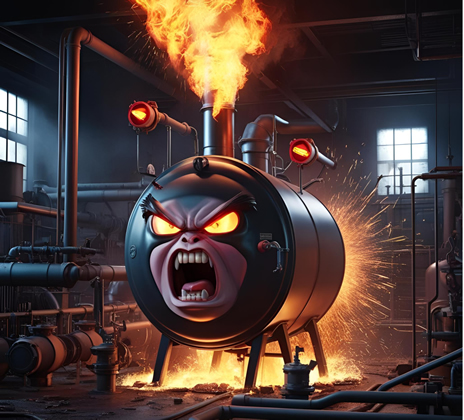Why you might need an external expansion vessel attached to your boiler
Ad - Advice from The Italian Plumber

Why you might need an external expansion vessel attached to your boiler
If you live in a one- or two-bedroom property, your boiler likely has an internal expansion vessel that is perfectly equipped to handle your hot water and heating needs—safely accommodating up to eight to ten small radiators.
Hey, unless you’re curious about boiler stuff in general, you can stop reading this article now and get on with your day. Catch you later. However, if you live in a larger property, you might need to consider having an external expansion vessel fitted. Not having one could actually cause some very serious and costly problems.
What exactly is an external expansion vessel?
An external expansion vessel is a cylindrical tank, usually red, that kind of resembles a UFO. It is typically positioned outside the boiler and designed to accommodate the expansion of water in a closed heating system as it heats up—preventing pressure buildup and potential damage.
In a central heating system—also known as a closed heating system—water expands when heated. The expansion vessel acts as a buffer, allowing this expansion to occur without causing excessive pressure, which could easily damage your pipes, boiler, or radiators.
The vessel is essentially a container with a rubber diaphragm that separates the water from what’s known as a pre-charged air space. As the water heats up and expands, it pushes against this space, accommodating the increased volume. In a nutshell, it prevents system overpressure and dangerous pressure spikes.
The benefits of fitting an external expansion valve
- Protects against pressure buildup and helps extend the life of your boiler.
- Maintains consistent pressure, preventing fluctuations in heating and hot water
- Reduces stress on radiators, radiator valves, the boiler’s automatic air vent, the pressure relief valve, and other system connections
Just like your boiler and heating system, expansion vessels require regular checks, with the rubber diaphragm typically lasting between 5 and 10 years.
If you're unsure whether you have one, need one, or need an inspection, just give us a call. The process is quick and painless—and it could save you money on replacement radiators, valves, and boiler repairs in the future.
Samuele The Italian Plumber
Other blog posts by Samuele can be read at theitalianplumber.co.uk/blog.
Until next time, if you have any plumbing or heating issues around the home, give us a call on 020 8945 7457.
Advertisement
March 27, 2025
Related links
|
